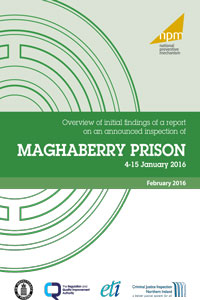Overview of initial findings of a report on an announced inspection of Maghaberry Prison
Publication: 24/02/16

Maghaberry Prison 'stabilised' but significant work remains to make prison safer for prisoners and staff
An inspection of Maghaberry Prison carried out in January 2016 has indicated the prison has 'stabilised' seven months after a multi-disciplinary team of Inspectors found the high security facility had become unsafe for both prisoners and staff.
Speaking today following the publication of the initial findings of the announced inspection Brendan McGuigan, the Chief Inspector of Criminal Justice in Northern Ireland and Martin Lomas, Her Majesty's Deputy Chief Inspector of Prisons in England and Wales, said they welcomed the action taken by the Northern Ireland Prison Service to start addressing the serious concerns that had been raised, particularly around safety and leadership.
"When the findings of the previous inspection report were published by Criminal Justice Inspection Northern Ireland (CJI), Her Majesty's Inspectorate of Prisons (HMIP), the Regulation and Quality Improvement Authority (RQIA) and the Education and Training Inspectorate (ETI) in November 2015, we indicated failures in leadership had led to Maghaberry becoming unsafe and unstable for prisoners and staff," said Mr McGuigan and Mr Lomas.
"The depth of our concerns were such we took the unprecedented step of announcing the inspection team would return to the prison in January. Following the completion of this work, our collective assessment was the prison had stabilised," said Mr McGuigan.
"While some progress had been made in addressing our concerns and the nine recommendations made in the November 2015 report, this progress was fragile. In my view, a significant amount of work remains outstanding to make Maghaberry safer for prisoners and staff and for this to reflect more positively in the outcomes for prisoners and their experience," continued the Chief Inspector of Criminal Justice.
"Urgent action had been taken to strengthen leadership within the prison with a new governor and transformed senior management team in place who were focused on stabilising the prison. A review of the Erne House fire has also been recently completed and lessons were being learned.
"A start has also been made in tackling the challenges around safety and Inspectors found some staff supervision had commenced in association rooms and exercise yards within Maghaberry. This should be extended to embed the more dynamic, modern approach to security which is required of a 21st Century prison establishment," said Mr McGuigan.
Mr Lomas indicated Inspectors remained concerned about the high levels of violence and the problems surrounding the availability of illicit drugs together with the diversion of prescription medication.
"While some aspects of primary health care had improved since May 2015, it was very worrying that mental health provision had deteriorated as a result of staff shortages and now needed urgent attention.
"Given the vulnerability of many of the men in Maghaberry Prison and the prevalence of such health problems, this was a significant additional area of concern and we have been reassured by the South Eastern Health and Social Care Trust that it is prioritising this issue," he said.
The inspection report noted that while restrictions to the daily regime within the prison were still significant, they had reduced from previous levels.
"More prisoners were now attending activities and achievements were increasing. A new 'core day' had been introduced which was enabling prisoners in full-time work to achieve over nine hours out of cell. Inspectors also noted that fewer men were locked up during the working day," said Mr McGuigan.
The Chief Inspector of Criminal Justice said that while attention had been given to lessening the impact of the separated prisoner regime on the rest of the prison, and staff working in these units were now benefitting from a staff rotation and support scheme, the situation remained challenging and complex.
"Historically, we have found Maghaberry to be a prison which has struggled to adapt to the requirements of a 21st Century prison establishment and one where the legacy of the past, has been a major impediment to its progress in providing safe, decent and rehabilitative outcomes for the men held there.
"Whilst the senior management team has started to raise expectations of what is wanted from and for the men in its care, and this was reflected in some of the staff that we met, it was not the norm. Many staff adhered to the view that prisoners were to be feared and that they could do little to influence prisoners' custodial or future behaviour on release.
"This is a matter of culture and one which will be difficult to change. It will take time but is, in our view, essential for the long-term modernisation of the prison to make it fit for the 21st Century," said Mr McGuigan.
He continued: "As an indication of our commitment to managing the risks identified in our November 2015 inspection report, it is our intention over the next 18 months to support the prison governors at Maghaberry, to oversee the delivery of the nine inspection recommendations, through a series of announced, low-impact visits to the prison.
"We have taken this step to ensure the early momentum found at Maghaberry last month is not lost, and the fragile progress made to date is strengthened so that the Northern Ireland Prison Service does not allow Maghaberry to regress," concluded Mr McGuigan.